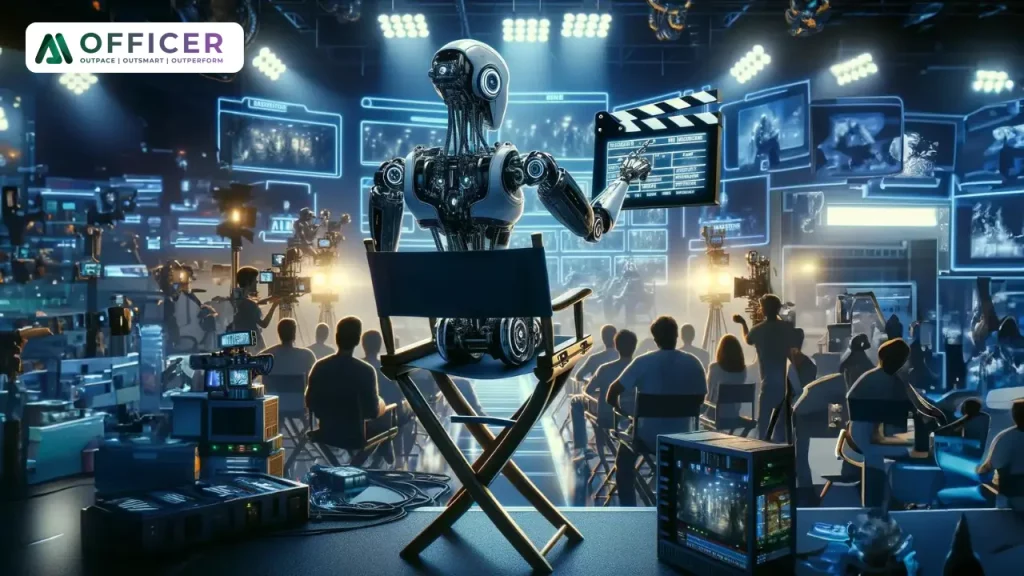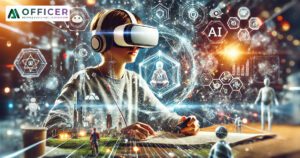
Settling into your cinema seat, popcorn clutched in hand, ready to be transported by a captivating story and there’s a twist! The mastermind behind the magic on screen isn’t a visionary director, but a complex algorithm.
Artificial intelligence (AI) is rapidly transforming industries and film-making is no exception. The question on everyone’s mind : Can AI actually direct a blockbuster?
The film industry, a realm where creativity meets technology, is on the cusp of a revolution, spearheaded by artificial intelligence. From script-writing to post-production, AI is not just assisting but leading the way in creating cinematic masterpieces. Neil Sahota, a Forbes contributor, explores this very topic in a recent article, highlighting the growing influence of AI in movie studios.
Let’s dive into the fascinating intersection of AI and film production.
FROM SCRIPT ROOM TO SILVER SCREEN
The journey begins in the writers’ room, a place traditionally fueled by human imagination. But AI, with its prowess in natural language processing, is now a collaborator. Tools like ScriptBook are revolutionizing script analysis, not just predicting box office success, but offering insights into plot, character development and even emotional resonance, similar to how a human story analyst might.
For instance, 20th Century Fox leveraged AI to dissect the script of “Logan,” guiding crucial decisions about the movie’s narrative and themes. The pre-production phase also sees AI’s influence in casting and location scouting, with platforms like Cinelytic evaluating actors’ market value and social media presence to forecast a film’s financial prospects.
AI’s Transformative Power in Film-making and Visual Effects
When it comes to film-making and visual effects, AI’s role is nothing short of transformative.
Disney’s Face Director software, for example, can meld multiple takes to craft the perfect expression, enhancing actor’s performances in post-production.
This technology was instrumental in “Avengers: Infinity War,” ensuring the emotional resonance of complex CGI scenes. Moreover, AI-driven deep fake technology, despite its controversies, offers a cost-effective alternative to traditional CGI, as seen in “The Irishman” for de-aging actors.
STREAMLINING THE PROCESS – AI IN POST-PRODUCTION AND DISTRIBUTION
Post-production is another area where AI significantly cuts down time and costs. Adobe’s Sensei automates tedious tasks like object removal and scene stabilization, while AI algorithms in sound design create realistic soundscapes, streamlining the sound design process.
The distribution and marketing realms are not untouched by AI either. Netflix’s recommendation algorithms enhance user experience, and AI tools analyze social media data to tailor marketing strategies, as Warner Bros. did with “Aquaman,” contributing to its box office success.
THE FUTURE OF FILM-MAKING : BOUNDLESS POTENTIAL AND PERSONALIZED EXPERIENCES
Looking ahead, the potential of AI in movie studios is boundless. Virtual film-making, where directors can create entire environments with AI-powered tools, AI-driven narrative development that adapts to audience preferences in real-time, and enhanced immersive experiences in movies through AR and VR are just the tip of the iceberg.
AI could revolutionize storytelling, aligning films more closely with audience preferences and societal trends. The integration of AI in film-making promises a future where movies are not only more efficient and cost-effective but also more engaging and personalized.
As we stand on the brink of this new era, it’s clear that AI has a pivotal role to play in the future of film production. The fusion of AI and cinema is not just about technology; it’s about re-imagining the art of storytelling.
As we embark on this exciting journey, the question isn’t whether AI can direct a blockbuster (though it might someday contribute significantly to the process!), but how we can leverage AI to unlock new dimensions of creativity and storytelling in cinema.
But what does this mean for the industry and its professionals? Our AI Officers bridge the gap between technology and creativity, ensuring that AI’s capabilities are harnessed to empower filmmakers, not replace them.
For those intrigued by the possibilities of AI in cinema and beyond, Connecting with our AI Officers can provide valuable insights into how this technology is shaping the future of content creation.
As we continue to explore the frontiers of AI in film production, stay tuned to our pages for the latest developments and breakthroughs.




